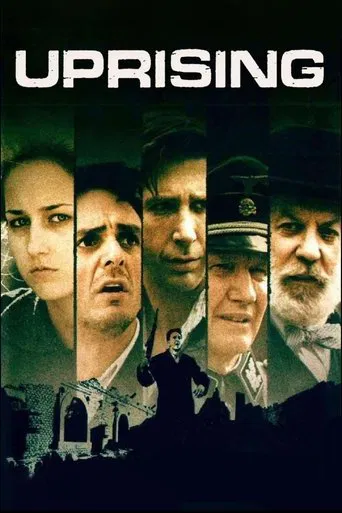

Holocaust is a tough topic to make films about. You either cling on with the Jews and neglect the other side, or dwell upon the atrocities of the Nazis and show less of the sufferers' fight, or you try to get a more or less healthier balance, just as The Pianist or Korczak or Schindler's List did. This mini-serial is a good job, with an excellent array of fine actors. Leelee Sobeski, Hank Azaria, Cary Elwes, Jon Voigt, David Scwimmer, Radha Mitchell and many others did a decent and fine job. They play well, deep, sincere and very true. We trust them all the time. What is not so good, is the rather jumpy sequence of events, with certain holes and omissions, with sudden changes in narration and certain bad montage work in battle scenes. What is not good is a very dubious portrayal of Soviet and Polish sides in the uprising, as well as some vague moments with Azaria's initial escape, or some not clear moments with Stroop's personality. It is clear that the film was planned to be longer, but then cut and shortened, that made it a bit strange in places. All in all, this is a good effort, but I agree with many people, now it will be very unrealistic to make another masterpiece as Schindler's List or The Pianist - they have done the job well. Recommended anyway for the serious audience
... View MoreI went to the library one day and saw this movie on the shelf, i had vague memories of this being on TV a few years ago and thought i should watch it. I had to push myself to get through the first half hour before it got better. The acting starts out really bad and the dialog is horribly written. But at a certain point it hooks you in and the rest of the film is pretty good. I didn't know much about the Warsaw uprising until i saw this movie, then i asked my dad who like me is a history buff and happened to know a lot about this. He thought it was pretty good but we just didn't think the acting was very good. Jon Voight was the biggest disappointment, i am usually a fan of his work but this just came up short for me. All in all a 6 out of 10 film.
... View MoreI'm not going to deliberate, or point out the historical inaccuracies of this film; other posters have already done this. I will instead say how utterly disgusted I was by the portrayal of the Pole during this film. Being of Polish Jewish decent, and having a grandfather who lived through the Warsaw uprising, and having heard first hand of what occurred here, I can only say that this film does a great disservice to the men and women who fought with next to nothing to keep the Germans at bay for over a month. If anything, it should also be pointed out that in all likelihood the uprising would have been a success if the governments of Britain and the United States had come through on their promises, however that information, like so much other vital information about the uprising and the AK is excluded from this film.
... View MoreHank Azaria is the new Rodney Dangerfield. Why? Because he gets no respect! For instance, Hank Azaria is the star of the movie. He does an excellent job with a polish accent. He must have spent months in the gym buffing up for the role and he is in most of the movie. Then again, he is not listed as the lead star of the movie. This honor goes to Leelee Sobieski, whom, is only in no more than half the movie and has very little lines. Then again, she did go nude for about 15 seconds. While you do not see Mr. Azaria's backside or front side, Ms. Sobieski covers some of what God gave her, while the rest is on display for the audience's liking. This is a good television movie. Powerful and entertaining. Still, this movie's fanbase is made up of teenage boys who want to see Leelee Sobieski's 15 seconds of nude fame. Pity, this is a decent movie and worth watching.David Schwimmer
... View More